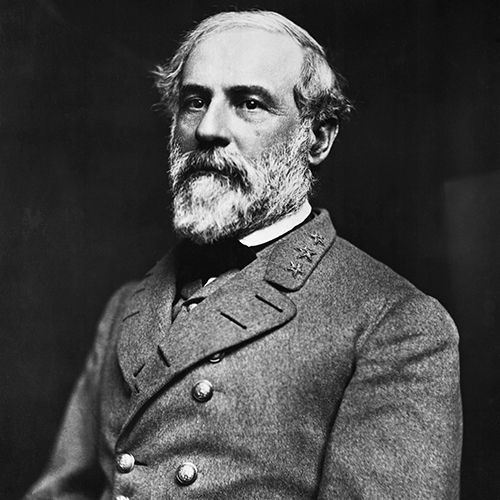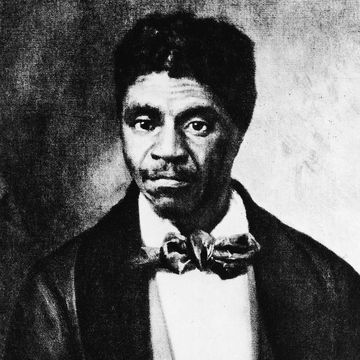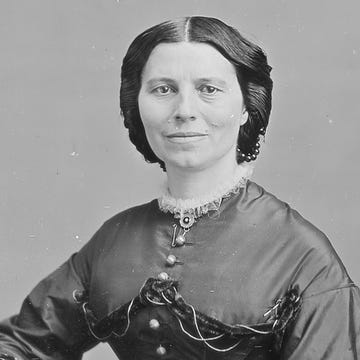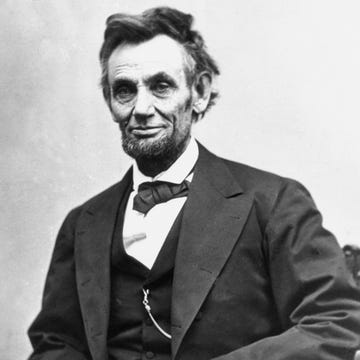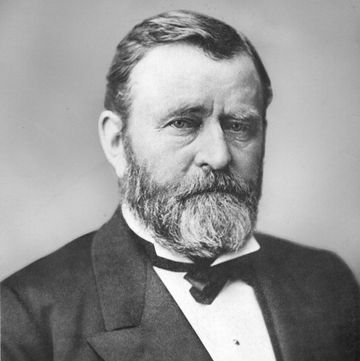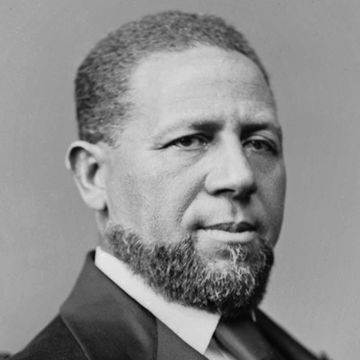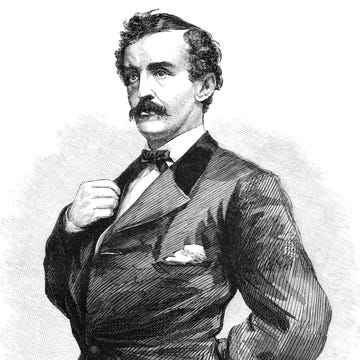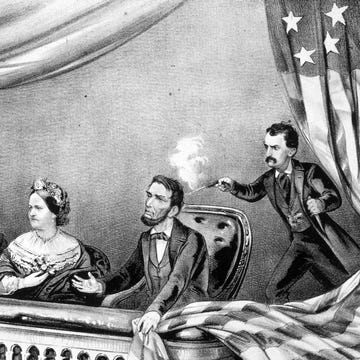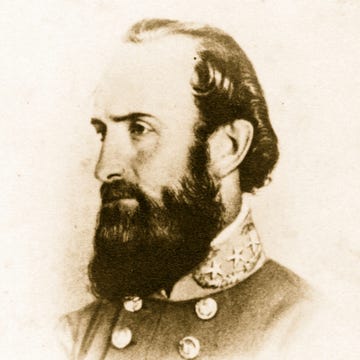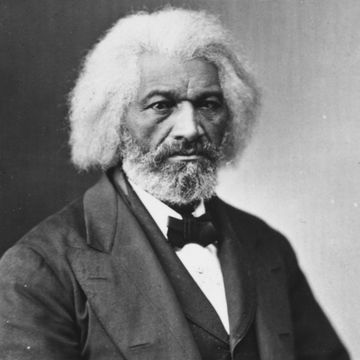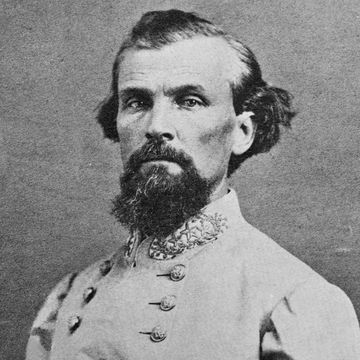1807-1870
Who Was Robert E. Lee?
Robert E. Lee became military prominence during the U.S. Civil War, commanding his home state's armed forces and becoming general-in-chief of the Confederate troops toward the end of the conflict. Though the Union won the war, Lee earned renown as a military tactician for scoring several significant victories on the battlefield. He became president of Washington College and, renamed Washington and Lee University after he died in 1870.
Quick Facts
FULL NAME: Robert Edward Lee
BORN: January 19, 1807
DIED: October 12, 1870
BIRTHPLACE: Stratford, Virginia
SPOUSE: Mary Custis (1831-1870)
CHILDREN: George Washington Custis, William “Rooney,” Robert Jr, Mary, Anne, Eleanor Agnes, and Mildred
ASTROLOGICAL SIGN: Capricorn
Early Years
A Confederate general who led southern forces against the Union Army in the U.S. Civil War, Robert Edward Lee was born on Jan. 19, 1807, at his family home of Stratford Hall in northeastern Virginia.
Lee was cut from Virginia aristocracy. His extended family members included a president, a United States chief justice, and signers of the Declaration of Independence. His father, Colonel Henry Lee, also known as "Light-Horse Harry," was a cavalry leader during the Revolutionary War. He earned recognition as one of the war's heroes, winning praise from General George Washington.
Lee saw himself as an extension of his family's greatness. At 18, he enrolled at West Point Military Academy, where he put his drive and serious mind to work. He placed second in his graduating class after four spotless years without a demerit and wrapped up his studies with perfect scores in artillery, infantry, and cavalry.
Wife and Children
After graduating from West Point, Lee married Mary Custis, the great-granddaughter of Martha Washington (from her first marriage before meeting George Washington) in 1831. The couple wed on Mary Custis’s family plantation in Arlington, Virginia, just outside Washington, D.C. They would make the estate their primary home for the next 30 years. In 1857, Mary inherited the Arlington plantation outright following her father’s death. However, after the outbreak of the Civil War, Union troops occupied the plantation, and the federal government seized the land. In 1864, the government began constructing a new national cemetery to bury and honor the war’s military dead. After that, the former Custis/Lee home was transformed into one of the most hallowed places in American history—Arlington National Cemetery.
Together, they had seven children: four daughters (Mary, Annie, Agnes, and Mildred) and three sons (Custis, Rooney, and Rob) who followed their father to serve in the Confederate Army during the Civil War.
Early Military Career
While Mary and the children spent their lives on Mary's father's plantation, Lee stayed committed to his military obligations. His loyalties moved him around the country, from Savannah to St. Louis to New York.
In 1846, Lee got the chance he had been waiting for his whole military career when the United States went to war with Mexico. Serving under General Winfield Scott, Lee distinguished himself as a brave battle commander and a brilliant tactician. In the aftermath of the U.S. victory over its neighbor, Lee was held up as a hero. Scott showered Lee with particular praise, saying that if the United States went into another war, the government should consider taking out a life insurance policy on the commander.
But life away from the battlefield proved difficult for Lee to handle. He struggled with the mundane tasks associated with his work and life. For a time, he returned to his wife's family's plantation to manage the estate following the death of his father-in-law. The property had fallen under hard times, and for two long years, he tried to make it profitable again.
Robert E. Lee and Slavery
Lee did not own slaves in his youth, but he and Mary Custis Lee inherited enslaved people from both his mother and her father, and it’s believed Lee himself owned between 10-15 enslaved people during his lifetime. His racial attitudes reflected much of his background, and while he wrote to Mary about the moral and political evils of slavery, he held views of white superiority. He saw slavery as necessary to maintain order between races. He opposed abolitionism, which he saw as a northern effort to inflict political will on the South.
When Lee’s father-in-law died in 1857, Lee became executor of his estate, tasked with managing the Arlington plantation. During this period, despite his father-in-law’s decree that his slaves be freed within five years of his death, Lee was accused of being a cruel and harsh overseer, with reports of beatings of some of the 200 enslaved people under his control, particularly those who had tried to escape.
In late 1862, to fulfill the terms of his father-in-law’s will, Lee signed deeds freeing some 150 of the enslaved workers at Arlington and other Custis plantations. Just a few months later, the Emancipation Proclamation went into effect in January 1863, freeing enslaved peoples in Confederate territory. Despite the Proclamation, Lee, during his Gettysburg campaign later that year, continued his practice of seizing freed Blacks in Union territory to be sent into slavery in the South. Towards the end of the war, with the Confederacy desperate for recruits, he supported the idea of allowing enslaved peoples to serve in the army in exchange for their freedom. Still, the war ended before the policy was enacted.
Confederate Leader
In October 1859, Lee was summoned to put an end to an enslaved person insurrection led by John Brown at Harper's Ferry. Lee's orchestrated attack took just an hour to end the revolt, and his success put him on a shortlist of names to lead the Union Army should the nation go to war.
But Lee's commitment to the Army was superseded by his commitment to Virginia. After turning down an offer from President Abraham Lincoln to command the Union forces, Lee resigned from the military and returned home. While Lee had misgivings about centering a war on the slavery issue, after Virginia voted to secede from the nation on April 17, 1861, Lee agreed to help lead the Confederate forces.
Over the next year, Lee again distinguished himself on the battlefield. On June 1, 1862, he took control of the Army of Northern Virginia and drove back the Union Army during the Seven Days Battles near Richmond. In August of that year, he gave the Confederacy a crucial victory at Second Manassas (also known as the Second Battle of Bull Run).
But not all went well. He courted disaster when he tried to cross the Potomac at the Battle of Antietam on Sept. 17, barely escaping the site of the bloodiest single-day skirmish of the war, which left some 22,000 combatants dead.
From July 1-3, 1863, Lee's forces suffered another round of heavy casualties in Pennsylvania. The three-day stand-off, known as the Battle of Gettysburg, wiped out a vast chunk of Lee's army, halting his invasion of the North while helping to turn the tide for the Union.
By the fall of 1864, Union General Ulysses S. Grant had gained the upper hand, decimating much of Richmond, the Confederacy's capital, and Petersburg. By early 1865, the fate of the war was clear, a fact driven home on April 2 when Lee was forced to abandon Richmond. A week later, a reluctant and despondent Lee surrendered to Grant at a private home in Appomattox, Virginia.
"I suppose there is nothing for me to do but go and see General Grant," he told an aide. "And I would rather die a thousand deaths."
Final Years and Death
Saved from being hanged as a traitor by a forgiving Lincoln and Grant, Lee returned to his family in April 1865. He eventually accepted a job as president of Washington College in western Virginia and devoted his efforts toward boosting the institution's enrollment and financial support.
In late September 1870, Lee suffered a massive stroke. He died at his home in Lexington, Virginia, surrounded by family, on Oct. 12. He was buried in a chapel at nearby Washington College. Shortly afterward, the college was renamed Washington and Lee University.
Disputed Legacy and Statue
In the decades after the Civil War, sympathizers regarded Lee as a heroic figure of the South. Several monuments to the late general sprung up before the end of the 19th century, notably in New Orleans, Louisiana, and Dallas, Texas. Lee’s birthday is commemorated in several southern states. Until 2020, Lee-Jackson Day (also commemorating Civil War General Stonewall Jackson) was celebrated each January in Virginia. Texas celebrates Lee on his Jan. 19th birthday as part of Confederate Heroes Day. Mississippi and Alabama celebrate a combined state holiday in late January honoring both Lee and civil rights leader Martin Luther King Jr, while Florida commemorates Robert E. Lee Day as an unofficial state holiday.
Lee's complicated legacy became part of the culture wars that engulfed the country more than a century later. While some sought to have statues of Confederate leaders removed from public view, others argued that doing so represented an attempt to erase history. In 2017, after the City Council of Charlottesville, Virginia, voted to move a Lee statue from a park, Charlottesville became the site of several protests and counter-protests; in August, numerous demonstrators clashed, resulting in one death and 19 injuries.
In late October 2017, President Donald Trump's chief of staff, John Kelly, further fanned the flames of the controversy with his appearance on Fox News. Addressing the topic of a Virginia church's decision to remove plaques that honored both Lee and Washington, Kelly called the Confederate general an "honorable man" and pointed to the "lack of an ability to compromise" as the cause of the Civil War. This analysis drew the ire of opponents.
Robert E. Lee in Movies
Robert E. Lee has been the subject of numerous biographies, documentaries, and novels, including several “alternative history” books depicting the South as winning the Civil War. Among the most popular books featuring Lee is a trilogy of novels. The first, written by Jeffrey Shaara, was the Pulitzer Prize-winning The Killer Angels, which became the basis for the 1993 film Gettysburg, starring Martin Sheen as Lee. After Jeffrey’s death, his son Michael completed the trilogy, publishing Gods and Generals and The Last Full Measure, the former of which was adapted into a 2003 film of the same name, starring Robert Duvall—himself a descendant of Robert E. Lee—as the famed general.
Quotes
- I suppose there is nothing for me to do but go and see General Grant. And I would rather die a thousand deaths.
- Do your duty in all things. You cannot do more; you should never wish to do less.
- I cannot trust a man to control others who cannot control himself.
- Whiskey: I like it, I always did, and that is the reason I never use it.
- Obedience to lawful authority is the foundation of manly character.
- The education of a man is never completed until he dies.
- Never do a wrong thing to make a friend or keep one.
- You cannot be a true man until you learn to obey.
- In this enlightened age, there are few, I believe, but what will acknowledge that slavery as an institution is a moral and political evil in any country.
- You see what a poor sinner I am and how unworthy to possess what was given me; for that reason, it has been taken away.
- Everybody kind of perceives me as being angry. It's not anger, it's motivation.
- It is good that war is so horrible, or we might grow to like it.
Fact Check: We strive for accuracy and fairness. If you see something that doesn’t look right, contact us!
The Biography.com staff is a team of people-obsessed and news-hungry editors with decades of collective experience. We have worked as daily newspaper reporters, major national magazine editors, and as editors-in-chief of regional media publications. Among our ranks are book authors and award-winning journalists. Our staff also works with freelance writers, researchers, and other contributors to produce the smart, compelling profiles and articles you see on our site. To meet the team, visit our About Us page: https://www.biography.com/about/a43602329/about-us
